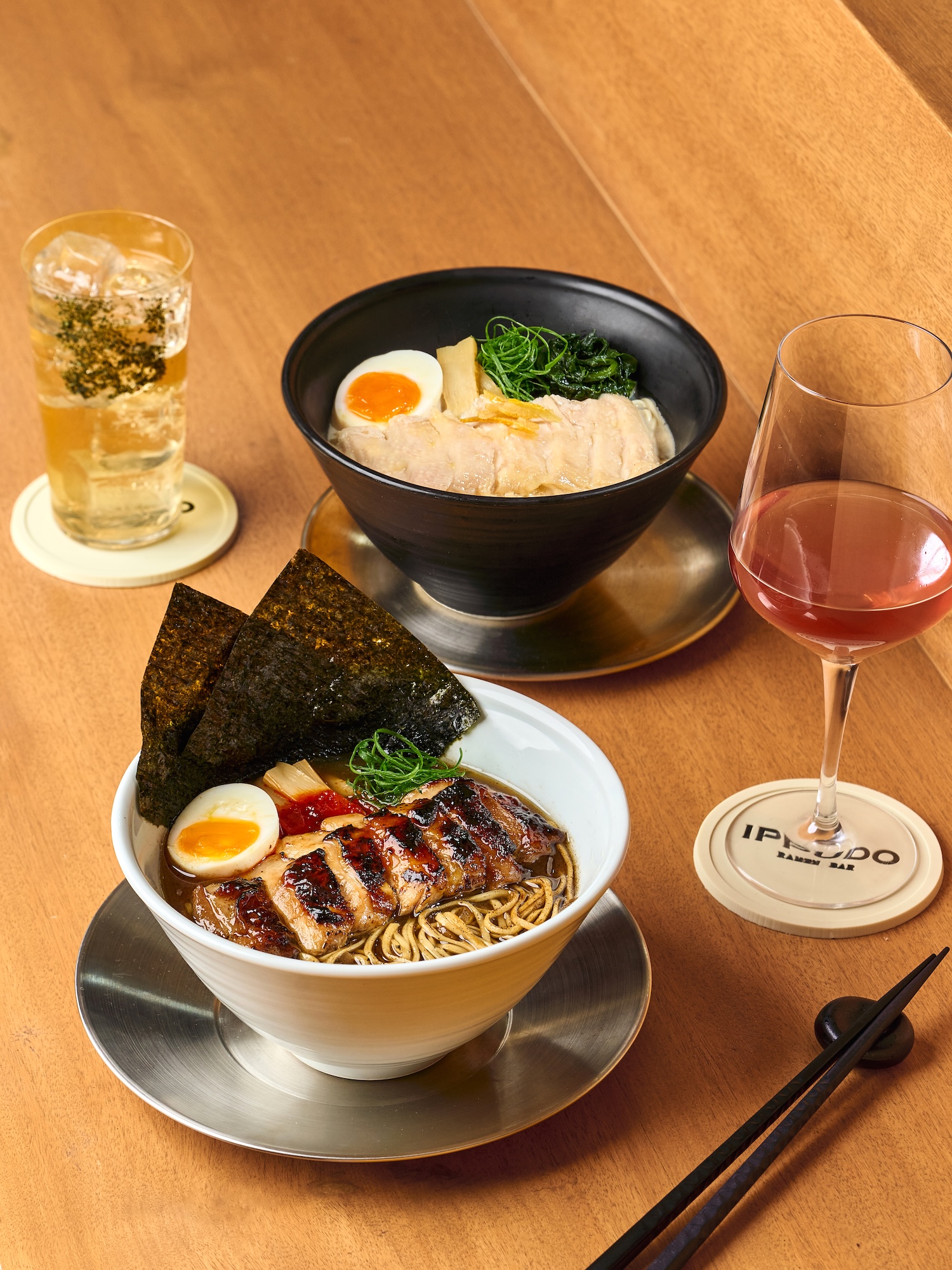Ippudo Ramen Bar upgrades Manila’s ramen scene
At its beautiful Uptown BGC location, Ippudo’s first-of-its-kind ramen bar is still known for its signature tonkotsu bowls but Filipinos should probably slurp on several lip-smacking exclusives on its menu.
The first is the grilled chicken kuro ramen whose rich foundational chicken broth is refined with black garlic and onion oil. But it’s the simple addition of the binchotan-grilled teriyaki chicken—with its deep smokiness and flavor—that makes this an expectedly umami-filled favorite. For a flutter of floral sweetness and citrus, a white chicken yuzu ramen made with a yuzu-infused pork broth lends an odd pleasure to each slurp and bite to the chewy noodles.

Of course, this being a Standard Hospitality Group collaboration with Ippudo (Chikaranomoto Holdings) means there are a million options to taste and try—from the just-enough-heat of the honey jalapeño snapper roll and the salmon soy ginger sashimi (from Koyo handroll bar) to the range of alcoholic and non-alcoholic drinks that include highballs, wines, and a lovely selection of Dassai 23, 39, and 45 sakes to pair with your choice dish.
“This concept bridges the past and the future of ramen, offering an exciting menu and dynamic ambiance for both loyal fans and first-time guests,” says John Concepcion, CEO and founder of Standard Hospitality Group.

All these new Ippudo Ramen Bar experiences are compressed into a modern Japanese space that embraces light wood and light that fills the atmosphere with a diffused, warm vitality as well as highlighting the new staff uniforms designed in collaboration with Commonwealth founder Omar Quiambao.
Ippudo Ramen Bar at Uptown BGC is open from 10 a.m. to 10 p.m. on Sundays to Thursdays and 10 a.m. to 12 mn on Fridays to Saturdays
Street food with champagne? A likely pairing
We all know by now that whatever the minds behind Hapag and Ayà touch practically becomes F&B gold. And yes, that even applies to their (un)likely pairing of Filipino street food and fine Champagne Delamotte on a one-night-only event last March 27.

“When I started at Hapag, the chefs asked me about my favorite Filipino food and wine pairing. My answer? Street food and champagne,” says Erin Ganuelas-Recto, sommelier and operations manager of Ayà. “It is something chef Nav, chef Thirdy, and I have always loved. There is something about the crisp bubbles cutting through the richness of barbecue or crispy chicken skin that just works.”
Turns out that Ganuelas-Recto was right.
The Chicha at Champagne pairings of chili cheese sticks (made with kesong puti mornay and jalapeños) and pork barbecue skewers with Champagne Delamotte’s Brut; crispy chicken skin nachos, stuffed chicken wings, and sisig piaya with the glorious purity of the Blancs de Blancs; and a bold chori burger the rosé all upended the idea of how best to enjoy Filipino street food and champagne.

“Champagne Delamotte is known for its elegant and refined flavors— particularly its style of balanced acidity, ripeness, and toasted notes,” says Ganuelas-Recto. “This balance of flavors makes them the perfect pairing for Filipino street food’s bold and unique flavors.”
“Maybe they will start seeing wine as more than just something for special occasions. Maybe they will realize that a glass of champagne is just as at home next to barbecue as it is next to caviar.”

Or, like in Ganuelas-Recto’s case, let street food and champagne become the theme of a party she and her husband threw just a few weeks ago.
“Either way, we want them to walk away excited and full.”
CCA Manila chef-instructors acquire ACF accreditation
One of the top culinary schools in the Philippines, perhaps unsurprisingly, is raising the culinary bar higher.
Seven chef-instructors of CCA Manila recently underwent the American Culinary Federation (ACF) accreditation process to continue elevating the kind of culinary education available locally.

“The ACF, the largest professional organization for chefs in North America, is known for its stringent certification process that evaluates culinary professionals on a comprehensive scale. This includes mastery of techniques, food safety, sanitation, time management, and menu planning,” says Dr. Veritas Luna, Chancellor.
Says chef and CCA Manila program manager Kerwin Funtanilla,, who earned the Certified Executive Chef certification (the second highest level in the process): “The ACF certification is a validation of the things you have learned and experienced. Cooking for the esteemed ACF team was an honor and privilege, and hearing them say they enjoyed my cooking was one of the best moments from the experience.”

Fellow Certified Executive Chef recipient Miguel Lorino meanwhile found it “nerve-wracking but rewarding.”
“We were given three hours for preparation, which seemed long at first, but when you’re actually taking the exam, three hours feels like 30 minutes,” he says.
CCA Manila first received its American Culinary Federation Education Foundation certification in 2006, “making it the first institution to acquire an ACFEF-accredited culinary program in the Asia-Pacific Region.”
